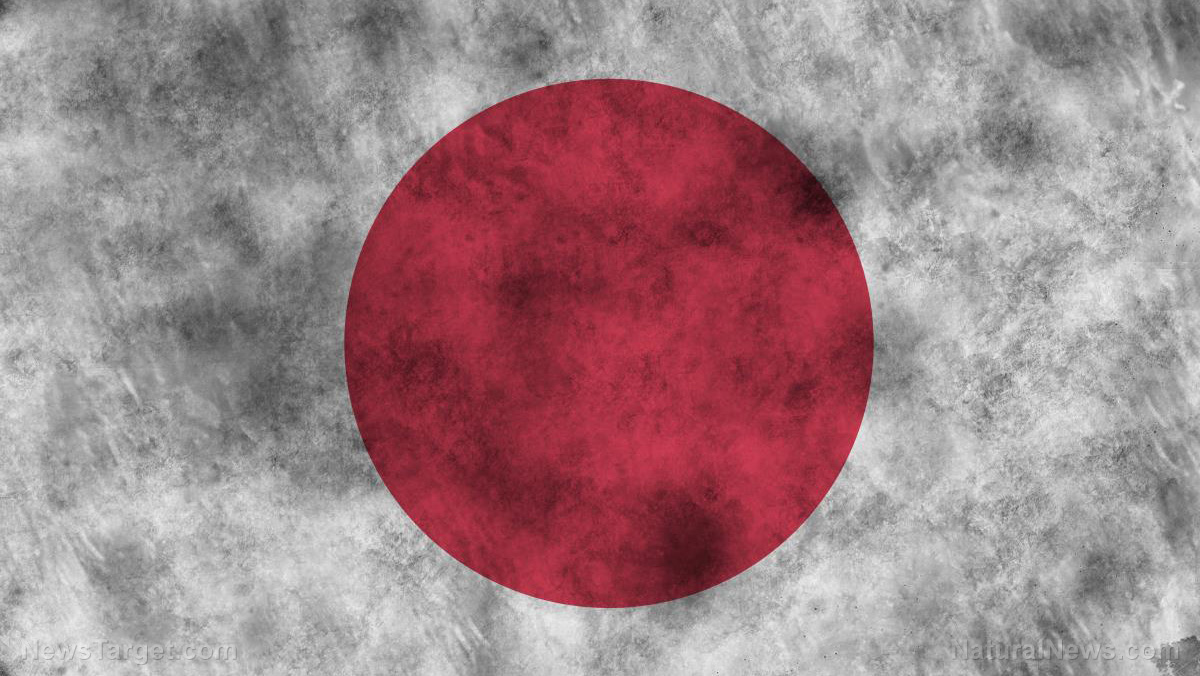Asian Countries & Asian People are the Whipping Boys of the Very EVIL Crime Cabal

Tokyo will provide 520 billion yen ($3.3 billion) in loans to Kyiv, financed by proceeds from Russian assets frozen under Western sanctions, according to a report by Kyodo News on Wednesday, July 17.
This figure represents approximately six percent of the substantial loan agreed upon by the Group of Seven (G7) nations during their summit in Italy in June.
At the summit, G7 leaders reached a consensus on utilizing interest from the frozen Russian assets to finance a $50 billion loan intended to assist Kyiv in acquiring weapons and rebuilding damaged infrastructure. (Related: EU okays transfer of $1.5B to Ukraine drawn from frozen Russian assets.)
Japanese authorities are expected to expedite the necessary procedures to finalize their share of this financial support by the end of the year, as reported by Kyodo.
G7 finance ministers and central bank officials are anticipated to approve the loan package, which will see the U.S. and the EU each providing $20 billion, while Japan, the U.K. and Canada will contribute a combined $10 billion, at a G7 meeting scheduled to take place in Rio de Janeiro later this month.
Following the escalation of the Ukraine conflict in February 2022, Western nations moved to freeze nearly $300 billion in assets belonging to the Central Bank of Russia.
The majority of these frozen assets are held in the EU, particularly with the Belgium-based depositary and clearing house Euroclear.
In May, Brussels approved a plan to utilize the profits generated from these frozen assets to support Ukraine’s recovery and military defense. Under this plan, 90 percent of the proceeds are designated for an EU-managed fund dedicated to Ukrainian military aid, while the remaining 10 percent will be allocated to other forms of support for Kyiv.
We are building the infrastructure of human freedom and empowering people to be informed, healthy and aware. Explore our decentralized, peer-to-peer, uncensorable Brighteon.io free speech platform here. Learn about our free, downloadable generative AI tools at Brighteon.AI. Every purchase at HealthRangerStore.com helps fund our efforts to build and share more tools for empowering humanity with knowledge and abundance.
Earlier this month, Ukrainian Defense Minister Rustem Umerov indicated that the funds would be directed towards bolstering Ukraine’s defense capabilities, supporting local manufacturers, and predominantly used for purchasing ammunition and air defense systems.
Moscow has denounced these Western measures, arguing that military assistance prolongs the conflict. Russia has also condemned the freezing of its assets, describing the use of these funds as outright “theft.” Kremlin spokesperson Dmitry Peskov has previously warned that the expropriation of Russian sovereign funds could create a dangerous precedent and deliver a significant blow to the Western economic system. He emphasized that Moscow would inevitably retaliate by pursuing legal action against entities that access its frozen assets.
In response to these concerns, the Kremlin has asserted that it will continue to challenge the legality of the asset freezes and any subsequent utilization of these funds, maintaining that such actions undermine international financial norms and principles.
Japan also supports G7’s use of frozen Russian assets
Japan, not a NATO member, has faced criticism for its June decision to support the G7’s use of frozen Russian assets, a move experts argue may breach international law and strain relations with Russia. Japan’s motivation lies in securing robust U.S. support for its security interests, but this step introduces political, strategic, and legal complications, particularly as Ukraine faces significant internal challenges.
One potential fallout is the cancellation of Japan’s role in the Sakhalin oil and gas project, involving Gazprom and Japanese firms like Mitsui and Mitsubishi.
If Russia decides to end Japan’s involvement, it could also undermine peace treaty negotiations and territorial discussions that have stalled.
Japan’s support for Ukraine occurs against a backdrop of escalating military ties between China and Russia, which pose threats to Japan’s security. Russia might use Japan’s stance on Russian assets as a pretext to intensify military threats, potentially impacting Japanese interests like the Ryukyu Islands and Okinawa.
Additionally, Japan is concerned about North Korea’s expanding nuclear capabilities and ballistic missile development, while its own missile defense efforts lag. Japan faces a recruitment crisis in its military and is dealing with a high disapproval rating for Prime Minister Fumio Kishida, who may face leadership challenges that could shift Japan’s foreign policy.
Read more stories like this at RussiaReport.news.
Watch this report about Congress spending $100 billion on war with Russia, China and Iran.
The Japanese politician Abe leaning towards BRICS was murdered. U.S. has bases all over Japan and no doubt in my mind they are creating MKULTRA assassins in Japan to use against Japanese politicians. This is the way the U.S. operates. Americans have been supporting a super-evil Crime Syndicate. After the U.S. bombed the crap out of Japan the leaders have been subservient to the Evil Triumvirate of U.S., U.K. and Israel to avoid more Nukes on Japan. I really HATE the U.S. for this. Hate them to the point when this evil regime goes down no one will be happier than me! I don’t care if I suffer and die too. I want this evil Triumvirate to go down. U.S./U.K./Israel are always Committing Genocides and Holocausts. No one in the world Likes these countries. HATED! The prejudice against Asians in the U.S. is Massive & Unrelenting. They are discriminated against at corporations, in Harvard admissions and against by poorly informed families they marry into. The Media has made Americans hate and fear Asians and encourages American Military to Degrade Asians.
Asian American Discrimination in Harvard Admissions☆
Abstract
Using detailed admissions data made public in the SFFA v. Harvard case, we examine how Asian American applicants are treated relative to similarly situated white applicants. Our preferred model shows that typical Asian American applicants would see their average admit rate rise by 19%, or approximately 1 percentage point, if they were treated as white applicants. We show that one of the channels through which Asian Americans are penalized is the personal rating and that including the personal rating cuts the Asian American penalty by less than half. While identifying the causal impact of race using observational data is challenging because of the presence of unobservables, this concern is mitigated in our setting. There is limited scope for omitted variables to overturn the result because (𝑖) Asian Americans are substantially stronger than whites on the observables associated with admissions and (𝑖𝑖) the richness of the data yields a model that predicts admissions extremely well.
The data we analyze covers six admissions cycles for applicants who, if they were to graduate in four years, would have done so as the Classes of 2014–2019. The Harvard admissions data is exceptionally rich. In addition to many demographic, geographic, and academic measures, the data include information on internal Harvard ratings that influence admissions decisions. These include Harvard admissions officers’ ratings of the applicants overall as well as ratings on academics, extracurriculars, athletics, and personal qualities. It also includes the admissions officers’ ratings of the letters submitted by high school counselors and teachers. Finally, the data include information on alumni interviews of the applicants in the form of an overall score and a personal score.
In this paper, we focus on typical Harvard applicants, or applicants who do not belong to one of the following groups: recruited athletes, legacies, donor connections, and children of faculty and staff (ALDC). These special applicants are predominantly white, receive large preferences in admissions, and are evaluated differently than typical applicants.1 Our primary sample excludes these special groups in an effort to make reasonable comparisons across similarly situated applicants. Importantly, more than 97% of Asian American applicants are not ALDC, meaning that our sample covers the overwhelming majority of Asian American applicants. However, we also show that our key findings regarding Asian American discrimination are robust to the inclusion of ALDCs.
Among typical applicants, Asian Americans actually have a slightly higher unconditional admit rate than whites. But as we show in Section 3, these unconditional admit rates mask substantial differences in qualifications between the two groups. While it is widely understood that Asian American applicants are academically stronger than whites, it is startling just how much stronger they are. During the period we analyze, there were 42% more white applicants than Asian American applicants overall. Yet, among those who were in the top ten percent of applicants based on grades and test scores, Asian American applicants outnumbered white applicants by more than 45%.2
Keywords
1. Introduction
For years, there has been a perception that Asian American applicants to elite US colleges and universities are held to a higher standard than similarly situated white applicants (Golden, 2006, Fuchs, 2019). Despite this public perception, empirical work on the topic is scarce, primarily due to lack of data. Universities tightly guard access to admissions data, and even the criteria by which universities score their applicants is often unknown. The SFFA v. Harvard case provided unprecedented access to Harvard’s admissions process. Using information made public through this lawsuit, we show that Asian American applicants are penalized relative to their observationally-equivalent white counterparts.
https://www.sciencedirect.com/science/article/pii/S0014292122000290
This video is from the Cynthia’s Pursuit of Truth channel on Brighteon.com.
17 minutes in video below explains murder of PM Abe in Japan.
More related stories:
G7 planning to escalate war by using frozen Russian assets to give billions more to Ukraine.
Saudi Arabia threatened to sell European debts if G7 confiscates Russian assets.
Switzerland confirms it holds $14.3 billion in FROZEN Russian assets.
Sources include:















